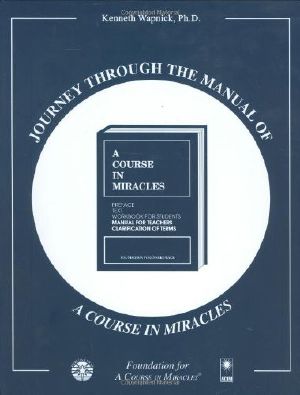Journey Through the Manual of a Course in Miracles

- Authors
- Wapnick, Kenneth
- Publisher
- Foundation for A Course in Miracles
- ISBN
- 9781591422075
- Date
- 2008-01-23T00:00:00+00:00
- Size
- 0.40 MB
- Lang
- en
The manual for teachers is organized around two themes and variations of these two themes. The first is that of separate versus shared interests, mentioned in its full form in the opening question, Who Are God s Teachers? There Jesus says of the teacher of God: His qualifications consist solely in this; somehow, somewhere he has made a deliberate choice in which he did not see his interests as apart from someone else s. This idea of shared interests is at the heart of the message of A Course in Miracles. It is the core of the Course s concept of forgiveness and can be recognized in the equation Jesus makes between teaching and learning. It is the first great theme in the manual, unifying the seemingly disparate questions that are the focus of each section. It emphasizes that we are all the same, reflecting the much larger theme: the Oneness of God s Son, and his perfect unity with his Creator and Source. The second theme is equally important. In fact, it would not be possible to learn that our interests are shared without it. This is the importance of asking the Holy Spirit for help the key to the practice of A Course in Miracles. By asking help of our inner Teacher, we become aware of our wrong-minded thought system and the ways in which we manifest it. In what the Course refers to as our right mind, the Holy Spirit gently corrects our misperceptions. This line-by-line presentation of the manual is organized around these two themes and their variations. The structure is inspired by the music of Beethoven, specifically the beautiful third movement of his Ninth Symphony; its two themes alternatively transcending the worldly and plumbing the depths of human feeling. In one sense, the purpose of this book is to demonstrate the masterful way in which Jesus weaves together his basic message with the musical form of theme and variation guiding us on our journey. The manual s distinctive role in the curriculum of A Course in Miracles is to instruct us how to teach this course, which means how we should learn it. Its purpose is to guide us in becoming teachers of God. In one way or another, each section shows us how to accomplish this. In the Introduction, Jesus stresses that teaching means demonstration, paralleling his statement in the text: Teach not that I died in vain. Teach rather that I did not die by demonstrating that I live in you (T-11.VI.7:4-5). The quasi-appendix to the manual, the clarification of terms, is also subject to a line-by-line analysis. Its six sections define and discuss some of the more important terms in the Course itself, and the epilogue closes with the following beautiful passage that is a fitting conclusion to our journey through A Course in Miracles: Let us go out and meet the newborn world, knowing that Christ has been reborn in it, and that the holiness of this rebirth will last forever. We had lost our way but He has found it for us. Let us go and bid Him welcome Who returns to us to celebrate salvation and the end of all we thought we made. The morning star of this new day looks on a different world where God is welcomed and His Son with Him. We who complete Him offer thanks to Him, as He gives thanks to us. The Son is still, and in the quiet God has given him enters his home and is at peace at last.